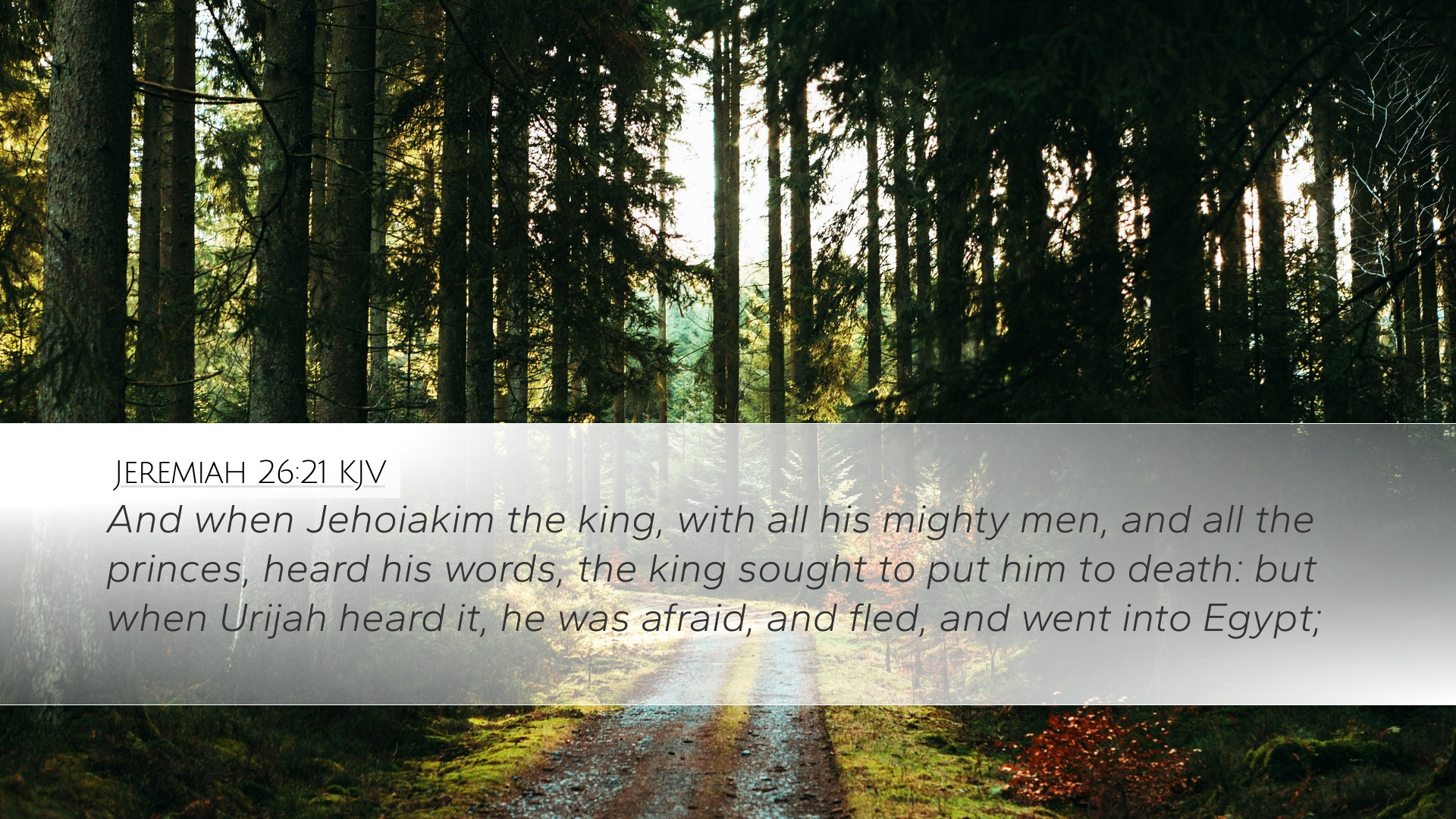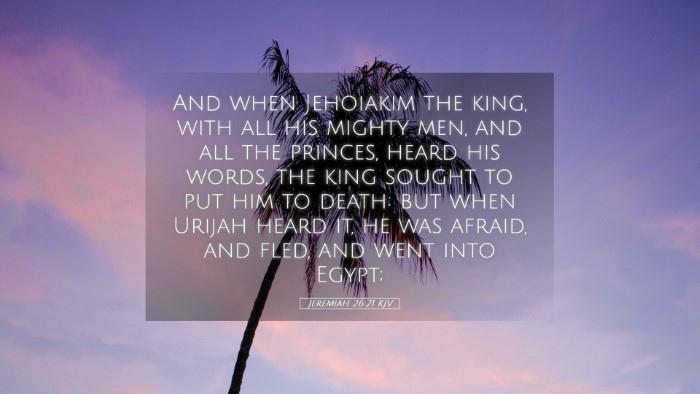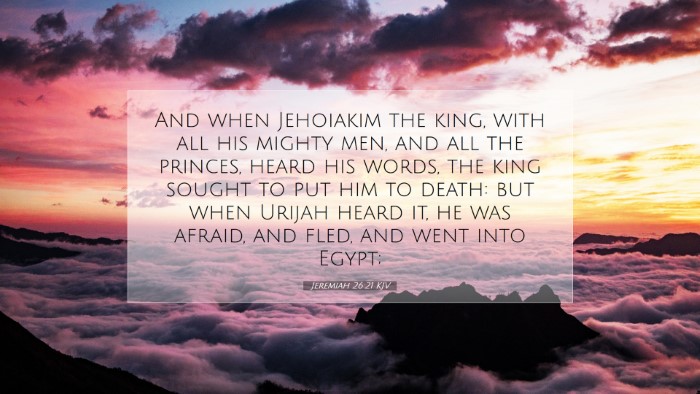Bible Commentary on Jeremiah 26:21
Verse Context: Jeremiah 26:21 states, "And when Jehoiakim the king, with all his mighty men, and all the princes, heard his words, the king sought to put him to death: but when Uriah the son of Shemaiah, of Kirjath-jearim, heard it, he was afraid, and fled, and went into Egypt."
Overview
This verse highlights a critical moment during Jeremiah's prophetic ministry, illustrating the perilous circumstances faced by prophets in a hostile political environment. The actions of King Jehoiakim and Uriah reflect the broader themes of conflict between divine authority and human power, the fear that often accompanies the prophetic calling, and the consequences of standing against corrupt regimes.
Commentary Insights
Historical Context
Matthew Henry's Commentary emphasizes the historical backdrop of Jeremiah’s prophecies during a tumultuous time in Judah’s history. The reign of Jehoiakim, marked by rebellion against God and alliances with foreign powers, set the stage for conflict between the rulers and the prophet’s message. Henry notes that Uriah, unlike Jeremiah, succumbed to fear, showcasing the human struggle against opposition.
The Response of King Jehoiakim
Albert Barnes elaborates on King Jehoiakim's reaction to the prophetic word. The king's desire to silence Uriah underscores the persistent threat to true prophecy in the face of political authority. Barnes points out that fear of losing power often leads rulers to take drastic actions against those who proclaim divine truth, highlighting the precarious balance actors must navigate between spiritual fidelity and earthly consequences.
The Character of Uriah
Adam Clarke provides a detailed assessment of Uriah's character. He notes Uriah's initial boldness in delivering God’s message but contrasts it with his eventual fear which drives him into exile in Egypt. Clarke suggests that Uriah represents many who, despite an initial call to serve, may falter under pressure. Clarke's insights delve into the theme of perseverance in faith amidst adversity.
Fear and Flight
Clarke's analysis further emphasizes the dichotomy of faith vs. fear in service to God. Uriah's response to the threats serves as a cautionary tale for believers, illustrating the human tendency to flee from peril rather than fulfill the prophetic calling. This fear can lead to spiritual compromise, as seen in Uriah's choice to seek refuge in a land known for its idolatry.
Lessons for Modern Believers
- Courage in Prophetic Witness: The need for courage in the face of opposition remains pertinent for contemporary Christians. Uriah’s flight serves as both a warning and a reminder of the essential nature of steadfastness in proclaiming the truth.
- Understanding Divine Sovereignty: The tension between divine authority and political power prompts reflections on the nature of God's sovereignty. Believers are called to trust in God's ultimate plan, even when faced with persecution.
- Community Support: Henry points out the importance of community in prophetic ministry. Just as Jeremiah had supporters, modern witnesses must seek solidarity and encouragement within the faith community to withstand external pressures.
Theological Reflections
The theological implications of Jeremiah 26:21 challenge both individual and collective understandings of faith under duress. The struggles of Uriah reveal humanity's innate fear of reprisal against standing for righteousness. This fear needs to be addressed through robust theological engagement that reaffirms God's promises of protection and provision for those who serve Him sincerely.
Implications for Pastoral Ministry
Pastors today can draw from Uriah’s narrative to inform their own practices and pastoral care, particularly in aiding congregants facing societal pressures and fears. The pastoral role includes fostering environments where voices that challenge the status quo can be supported and nurtured. In addressing fears that may deter believers from active faith and prophetic witness, pastors must emphasize that strength comes from reliance on God’s promises.
Calls to Action for Theologians and Scholars
This passage invites theologians and scholars to explore the interplay of faith and fear throughout scriptural narratives. The case of Uriah serves as a springboard for discussions surrounding the nature of prophecy, the historical context of prophetic resistance, and the implications of using fear as a tool for silencing dissent. A deeper exploration might consider the socio-political contexts that shape how God’s word is received and acted upon in various epochs.
Conclusion
Jeremiah 26:21 serves as a poignant reminder of the challenges faced by those who proclaim divine truths amid hostile climates. Insights from public domain commentaries converge to reinforce critical themes of courage, fear, and the stakes inherent in prophetic ministry. Both historical and modern contexts provide fertile ground for deeper reflection, challenging believers to embrace their calling, even in the face of adversity. As the church navigates contemporary issues, the lessons from Uriah’s experience remain profoundly relevant, urging all to stand firm in faith and proclaim the unchanging truth of God’s word.


